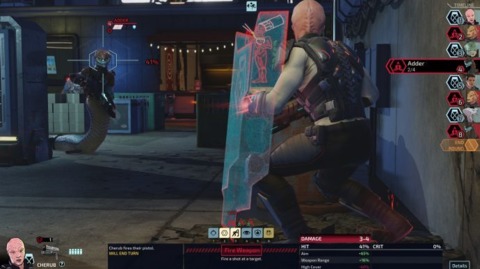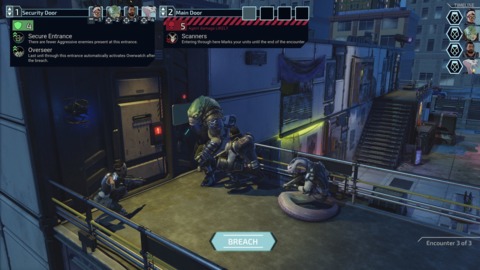XCOM: Chimera Squad: Snacking on Strategy
By jeremyf 5 Comments

Firaxis’s XCOM games are the modern touchpoint for the tactics genre, and for good reason. The balance between depth and accessibility has attracted droves of fans, each with a story about how a tragic missed shot destroyed a campaign. I have personally dumped an imposing number of hours into XCOM 2 and its expansion. Now, the studio aims to keep the flame going with XCOM: Chimera Squad. The budget title makes some noticeable changes to the series formula, ultimately making Chimera Squad a bite-sized XCOM experience in nearly every way.
The most immediate sign of Chimera Squad’s relative smallness is the game’s scope and setting. In previous games, the invisible commander fought for the entire planet. Now, you preside over a tiny subsidiary of XCOM in the diverse City 31. Following the war for Earth, aliens, humans, and hybrids now live in a shaky state of coexistence. Of course, this being a tactics game, there are bad guys stirring the pot. It’s up to Chimera Squad to shoot them in droves and prevent City 31 from falling into anarchy.

But by far the biggest difference from previous XCOM titles is the type of units under your command. One of the most beloved elements of the series is unit customization. Making soldiers in the image of friends and celebrities is typically half the fun. In Chimera Squad, though, there are just 11 preset characters to control. This allows each squad mate to have their own personality, abilities, and role on the battlefield. Some are powerhouses, like squad leader Godmother or magnificent gunslinger Blueblood. Others have support roles, like combat medic Terminal and the nearly useless Shelter.
Most notably, about half of the agents are aliens or hybrids. This means you get the opportunity to use some of the same abilities that are usually reserved for enemies. Have you always wanted to crush a bad guy with a huge snake? This is your chance. The game starts with four members on board, but more arrive as you progress. You have the choice of which soldiers join, and some will be left off the squad entirely. Still, I can’t help but notice a difference in psychology created by the change to distinct characters. Casting Battle Madness as Verge is always fun, but I don’t have the same attachment to him as I do with my created characters in XCOM 2. The potential for emergent stories is somehow lower.
The stakes are also lower. Letting your agents run out of health merely gives them a temporary debuff instead of permadeath (though I believe this is an option). This leads to some strange cases where a teammate is left bleeding on the ground during an evac, only to show up at base with the others little worse for wear. One advantage the squadmates now have is the ability to be more than blank slates. Banter between characters is a little too cute for its own good, but never unbearable. It fits with the story having less gravitas than past entries.
Aside from leaving behind custom units, the other big change in Chimera Squad is the turn order. In older games, all units on a single side took their turns together. Now, player and enemy units are all jumbled together in initiative. A few abilities can shift the turn order, but agents are generally spread out from one another. I appreciate the desire to change things up, but I think I prefer the old method. I love whittling down the possibilities into a plan, only to have that plan go off the rails with jaw-dropping misses and oversights. There are less opportunities to plan ahead in Chimera Squad because you usually don’t know what the map will look like the next time an agent is up. It encourages thinking on your feet, but it’s also less strategic.
One change I do like is to the pace of missions. Often, XCOM missions took place in long arenas where forward progress was always required. Here, each mission is split into a handful of combat encounters in boxy rooms. Each encounter starts with a breach phase which gives the opportunity for free damage on selected enemies. Everything now feels snappier, and the drawn-out battles of the past are absent. Instead of a three-course meal, encounters are snack food. This is the adjustment I would most like to see carried forward, perhaps in conjunction with more traditional missions.

he intermittent strategy layer also returns in miniaturized form. Item development and extra scenarios are still present, though base building is out. For the most part, it’s setting things to advance in the background, bearing fruit after running a few missions. You also want to assign a squad member to speed up the process, which means they aren’t available for combat. This aspect of the game is light, but the real challenge comes from battling the anarchy meter.
City 31 is split into nine districts. You must manage the temperature of each one to keep things in check. Districts won’t be happy when they’re neglected, and when one fills up completely, it adds to the anarchy meter. If that gets maxed out, you fail the campaign. You’ll also start getting “emergency” missions which aren’t that fun. I felt like I did everything I could to manage the meter, but I cut it close near the end. You have to take every chance you can to lower the thing.
While the above alterations definitely make Chimera Squad a bite-sized XCOM, it is XCOM nonetheless. 2K could have sold this as another expansion to XCOM 2 without most people batting an eye. Every enemy is a reskin of one from that game, if not lifted from it wholesale. The UI is identical, and I didn’t notice any changes in the “math” of combat. Any differences in gameplay come from the periphery. The core experience is very much preserved, but for the better.
Ultimately, deciding if Chimera Squad is for you comes down to your feelings on the series. Those wanting a game that drastically innovates on the strategy genre should look elsewhere. Conversely, if you adored XCOM 2 and the changes sound intriguing, I can give it a solid recommendation. At 20 hours for as many dollars, it’s not a risky proposition. I’m not always in for a drawn-out war, and in those times, it’s good to know that Chimera Squad is there to binge.
